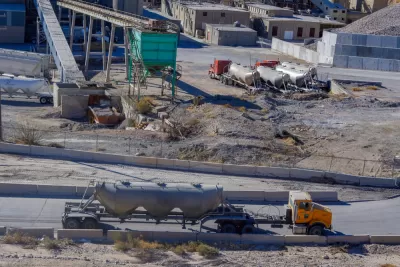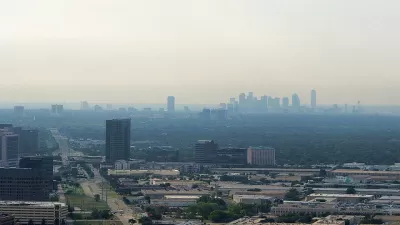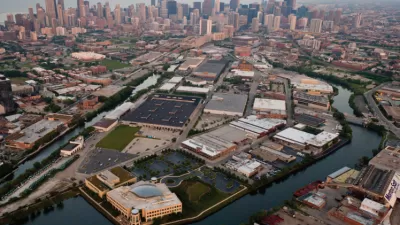Zoning in the U.S. was originally intended to keep noxious uses out of residential areas. Around Houston, which famously lacks a traditional zoning system, polluting uses are still granted broad permission to operate in residential areas.

Allyn West reports on the environmental problems created by concrete batch plants, and the residential neighborhoods dealing with the consequences.
The scene for this environmental justice drama is Harris County, Texas, where the Texas Commission on Environmental Quality (TCEQ) has granted 188 concrete plants the permits to operate, mostly in unincorporated parts of the county like Aldine, where eight concrete plants are currently operating. In Aldine, at least, local residents have scored a pair of recent victories to keep new concrete plants out.
"Though they produce one of the ubiquitous materials of cities, the concrete we pour for everything from sidewalks to stormwater pipes to skyscrapers, the unique combination of Houston’s lack of zoning, the region’s relentless outward growth and an overly permissive state environmental agency means that too many concrete batch plants are making it too hard to breathe," according to West.
This environmental justice issue has roots in the racist land use controls of the past, according to West. "Because land has been cheapened by redlining, disinvestment, restrictive covenants and environmental racism, polluters concentrate unevenly across the region, often intentionally in communities of color and low wealth, compounding other issues and creating entrenched disparities, almost all of which are being exacerbated by the coronavirus pandemic. Those who are exposed the most to pollution are the least responsible for it."
From the experiences of the community in Aldine, however, a model for resistance to the permissiveness of the TCEQ has emerged.
FULL STORY: ou don't want to live near a concrete batch plant. But TCEQ lets it happen too easily.

Planetizen Federal Action Tracker
A weekly monitor of how Trump’s orders and actions are impacting planners and planning in America.

Congressman Proposes Bill to Rename DC Metro “Trump Train”
The Make Autorail Great Again Act would withhold federal funding to the system until the Washington Metropolitan Area Transit Authority (WMATA), rebrands as the Washington Metropolitan Authority for Greater Access (WMAGA).

The Simple Legislative Tool Transforming Vacant Downtowns
In California, Michigan and Georgia, an easy win is bringing dollars — and delight — back to city centers.

The States Losing Rural Delivery Rooms at an Alarming Pace
In some states, as few as 9% of rural hospitals still deliver babies. As a result, rising pre-term births, no adequate pre-term care and "harrowing" close calls are a growing reality.

The Small South Asian Republic Going all in on EVs
Thanks to one simple policy change less than five years ago, 65% of new cars in this Himalayan country are now electric.

DC Backpedals on Bike Lane Protection, Swaps Barriers for Paint
Citing aesthetic concerns, the city is removing the concrete barriers and flexposts that once separated Arizona Avenue cyclists from motor vehicles.
Urban Design for Planners 1: Software Tools
This six-course series explores essential urban design concepts using open source software and equips planners with the tools they need to participate fully in the urban design process.
Planning for Universal Design
Learn the tools for implementing Universal Design in planning regulations.
Smith Gee Studio
City of Charlotte
City of Camden Redevelopment Agency
City of Astoria
Transportation Research & Education Center (TREC) at Portland State University
US High Speed Rail Association
City of Camden Redevelopment Agency
Municipality of Princeton (NJ)





























